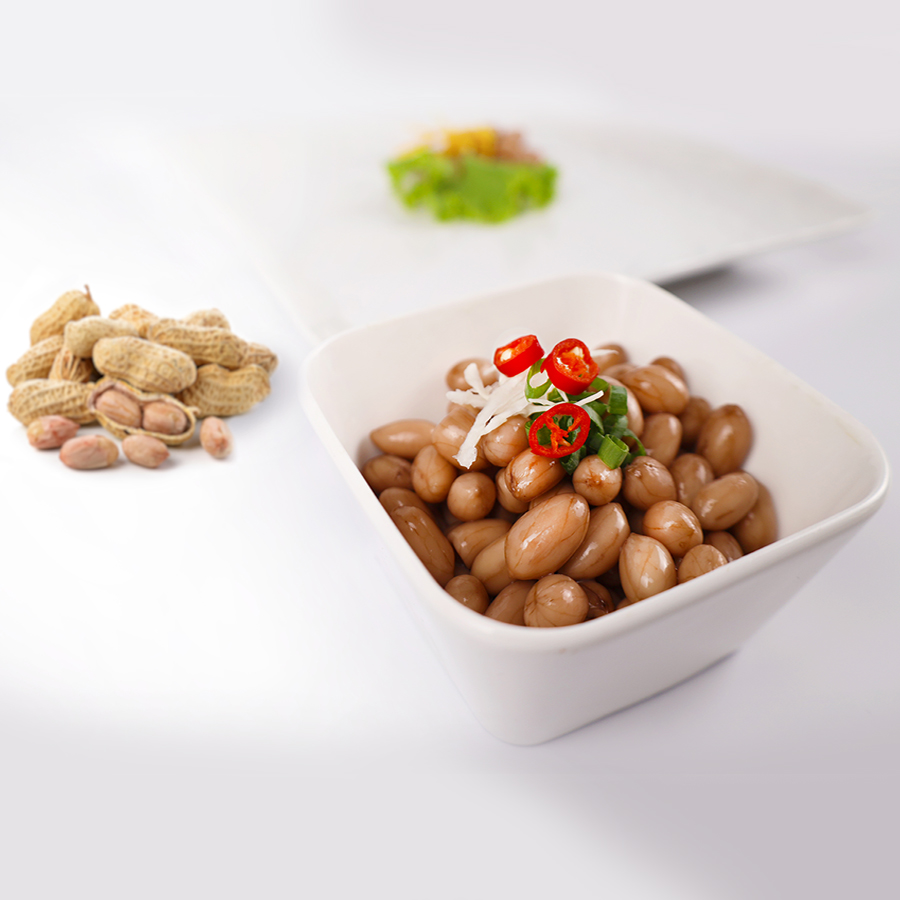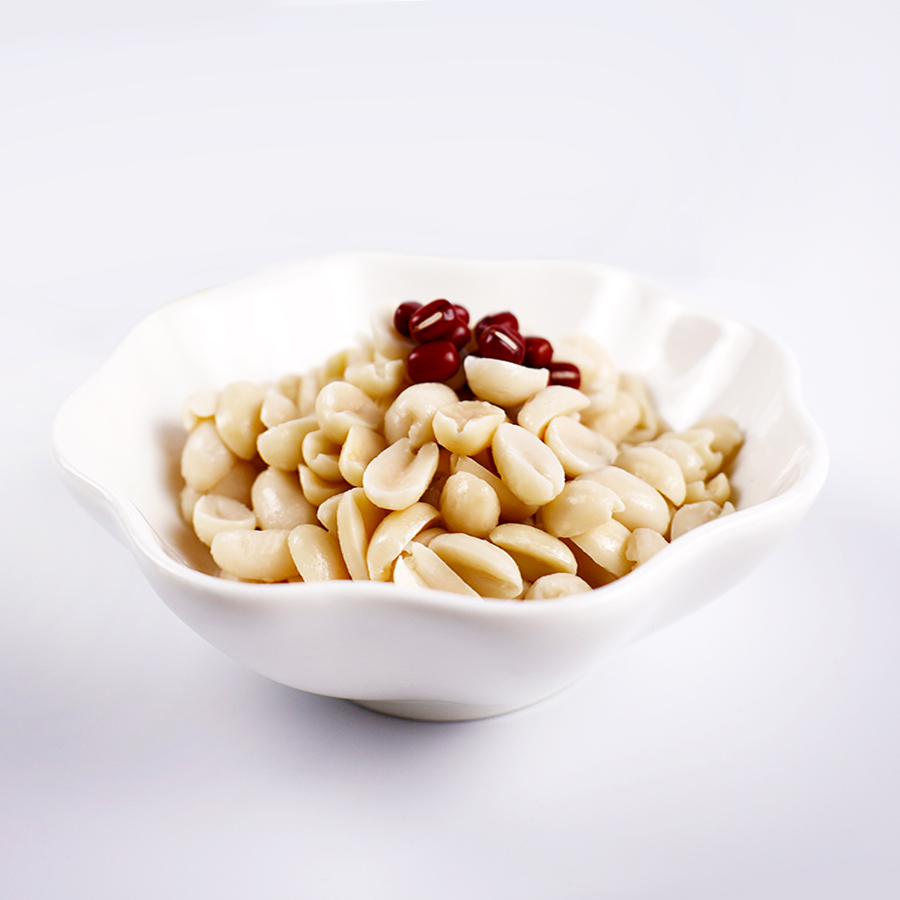Peanuts
Peanuts are also known as groundnut. It is mentioned in the "Supplements of Compendium of Materia Medica": "Peanuts have the effect of replenishing the spleen and stomach, moisturizing the lungs and resolving phlegm, nourishing and regulating qi, clearing the pharynx and relieving phlegm." Therefore, the ancients regarded peanuts as the "longevity fruit."
1. Rich in protein
Peanuts are an excellent source of plant-based protein. Each 100 grams of peanuts provides about 25 grams of protein, which accounts for about half of a person’s daily protein requirement. The recommended daily intake (RDA) for adult protein is:
Women 46g
Men's 56g
Protein is essential for building and repairing body tissues. Studies have shown that peanuts contain more grams of protein than other nuts. According to this study, the protein in peanuts has a high digestibility, which is almost the protein required by ordinary people every day.
2.Antioxidant
The antioxidant extracted from the shell through the process of boiling peanuts is 4 times than the raw peanuts. Peanuts are rich in antioxidants, which fight against free radicals in the body to prevent oxidation caused by free radicals.
(1). p-Coumaric acid: This polyphenol is one of the main antioxidants in peanuts
(2). Resveratrol: a powerful antioxidant that can reduce the risk of cancer and heart disease
(3). Isoflavones: an antioxidant polyphenol, isoflavones are related to a variety of health care effects
(4). Vitamin E: Has a rejuvenating (antioxidant) effect.
3. Healthy fats
Fatty acids are an important part of every diet. Most of the fat in peanuts is monounsaturated fatty acids and polyunsaturated fatty acids, both of which are healthy fats.
According to the American Heart Association (AHA), it is best to eat monounsaturated fatty acids and polyunsaturated fatty acids instead of saturated fatty acids and trans fatty acids, which can improve a person's cholesterol level and reduce the risk of heart disease and stroke.
Although 50 grams of boiled peanuts contains 20 grams of fat, less than 3 grams of this is saturated fat, and the rest comes from monounsaturated fatty acids and polyunsaturated fatty acids. The Institute of Medicine recommends at least 12 grams of healthy fatty acids per day.
4. Dietary Fiber
Peanuts are a good source of dietary fiber, each containing 8.5 grams per 100 grams, accounting for about one-fourth of the recommended fiber intake for men or one-third of the recommended intake for women.
The current dietary guidelines for Americans recommend the following daily intake of fiber for adults:
Male 34g
Female 28g
Fiber is a nutrient beneficial to heart health. AHA reports that eating fiber-rich foods can improve blood cholesterol levels and reduce the risk of heart disease, stroke, obesity and type 2 diabetes In addition, fiber is essential for healthy digestion, can remove feces and help prevent constipation; and a high-fiber diet may be the key to preventing diverticulitis.
5. Excellent source of various vitamins and minerals
- Biotin: Peanuts are one of the most abundant dietary sources of biotin, which is very important during pregnancy.
- Copper: essential for the formation of red blood cells and healthy blood vessels, nerves, immune system and bones
- Thiamine (Vitamin B1): 50 grams of boiled peanuts contain 20% of your daily requirement of thiamine, which is an essential nutrient required for the normal operation of all tissues in the body
- Niacin (Vitamin B3): 50 grams of boiled peanuts contain 10%-20% of your daily demand for niacin, which is an important B vitamin that helps convert food into energy. Helps digestion and nervous system, and also helps slow down skin aging.
- Folic acid (vitamin B9): 50 grams of boiled peanuts contains 16% of your daily requirement for folic acid. Cell division requires folic acid. This means that adequate folic acid intake is especially important during pregnancy and childhood, because the tissues are being Growth is rapid.
- Phosphorus: Peanuts contain phosphorus, which helps ensure proper nerve function and muscle contraction, and also helps the body convert food into energy. It is a good snack for athletes.
- Manganese: Peanuts contain manganese, which is a trace element. Manganese is very important for processing nutrients such as cholesterol, carbohydrates and protein.
- Magnesium: 50 grams of boiled peanuts contains 30% of your daily magnesium requirement. Magnesium can ensure the normal operation of nerves and muscle contractions, including the heart, enzyme functions and energy production.
- Zinc: Peanuts contain zinc, which is a mineral that has antioxidant properties and promotes wound healing.
- Potassium: Peanuts contain a good source of potassium, which helps regulate heart rhythm
- Vitamin E: is a dietary antioxidant that helps protect cells from oxidative stress, which is a normal but destructive physiological process.

6. Promote heart health
-
- Eating peanuts may help prevent coronary heart disease (CHD).
- A study conducted by the Harvard University School of Public Health found that peanuts can reduce bad cholesterol (LDL) levels
- Bad cholesterol can cause plaques in blood vessels, and peanuts may prevent this.
- The white quinoa in peanuts has antioxidant properties and helps fight heart disease, which is why peanuts seem to have similar cardioprotective effects to other foods containing white quinoa .
- A study conducted by Purdue University in the United States found that regular intake of peanuts can also lower triglycerides and further promote heart health. This effect can be attributed to the presence of monounsaturated fatty acids, folic acid and magnesium.
- Peanuts contain a lot of phytosterols, especially a substance called β-sitosterol. Phytosterols can reduce the absorption of cholesterol during digestion.
According to an analysis published in the Journal of Nutrition in 2008, peanuts help prevent coronary heart disease. Researchers examined four epidemiological studies and found that subjects who ate the most peanuts or nuts had a 35% lower risk of coronary heart disease. Nutritionists tend to reduce inflammation, lower LDL or "bad" cholesterol, less oxidation, and healthier blood vessels, all of which help reduce the incidence of heart disease Rate.
7. Prevention of Gallstones
Gallstones affect approximately 10-25% of adults in the United States. A study conducted by Harvard Medical School and Brigham and Women's Hospital (Boston) found that consumption of peanuts may lower the risk of gallstones. Men consuming vie or more units of nuts (including peanuts) a week are a lower risk of gallstone disease.
8. Helps control blood sugar
Adding peanuts to the diet will not increase blood sugar. Combining them with a meal high in GL (glycemic load, which indicates how a particular food affects your blood sugar levels) (such as bagels or a glass of juice) can stabilize your blood sugar levels. Peanuts have a GI (glycemic index) of 14. When peanuts have a GI of 14 (100 points scale), their GL is only 1. This is why the American Diabetes Association named peanuts as a diabetic superfood. The fiber in peanuts also helps lower blood sugar levels.
9. Can reduce cancer risk
High intake of peanuts (including other nuts) can reduce the risk of rectal cancer, postmenopausal breast cancer, gastric cancer and esophageal cancer.
10. Can relieve the symptoms of polycystic ovary syndrome (PCOS)
The monounsaturated fatty acids contained in peanuts help to improve the metabolic status of women with polycystic ovary syndrome.

11. Hair growth
The Omega 3 fatty acids in peanuts, and vitamin E are very beneficial to help hair growth and increase blood circulation around the scalp.
12. Maintain a healthy weight
Because peanuts are rich in healthy fat, protein, and fiber, they are a satisfying snack. Studies have found that compared with women who rarely eat peanuts (including nuts), women who eat peanuts (including nuts) twice a week have a relatively lower risk of weight gain and obesity within 8 years.
13. Low calorie consumption:
Peanuts are legumes, however, due to the similarity in nutritional content, they are usually classified as nuts. Although other raw nuts and roasted nuts are high in calories, boiled peanuts are low in calories. If boiled peanuts contain 90 calories, then dry roasted peanuts contain 166 calories, and roasted almonds contain 170 calories. Boiled peanuts also help control weight due to their low- calorie content.
14. Fast energy boost
50 grams of boiled peanuts contains about 280 calories, 12 grams of protein, 8 grams of fiber, 2 grams of natural sugar and no cholesterol in it. It can be used as a nutritious snack, providing a rapid energy boost, keeping you energetic, and effectively serving the brain and muscles provide the necessary nutrients needed to help you stick to the next meal.

